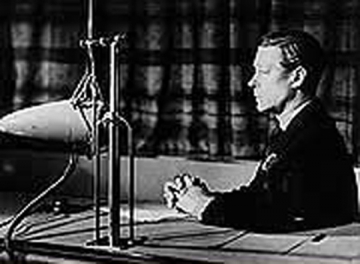lundi, 11 décembre 2006
Love story
 Le 11 décembre 1937, à 22 heures 30, Edouard VIII annonce sur les ondes de la B.B.C. qu'il renonce au trône royal, qu'il préfère vivre avec la femme qu'il aime, l'énigmatique Wallis Simpson, roturière, petite bourgeoise et divorcée...
Le 11 décembre 1937, à 22 heures 30, Edouard VIII annonce sur les ondes de la B.B.C. qu'il renonce au trône royal, qu'il préfère vivre avec la femme qu'il aime, l'énigmatique Wallis Simpson, roturière, petite bourgeoise et divorcée...
"At long last I am able to say a few words of my own. I have never wanted to withhold anything, but until now it has not been constitutionally possible for me to speak.
A few hours ago I discharged my last duty as King and Emperor, and now that I have been succeeded by my brother, the Duke of York, my first words must be to declare my allegiance to him. This I do with all my heart.
You all know the reasons which have impelled me to renounce the throne. But I want you to understand that in making up my mind I did not forget the country or the empire, which, as Prince of Wales and lately as King, I have for twenty-five years tried to serve.
But you must believe me when I tell you that I have found it impossible to carry the heavy burden of responsibility and to discharge my duties as King as I would wish to do without the help and support of the woman I love.
And I want you to know that the decision I have made has been mine and mine alone. This was a thing I had to judge entirely for myself. The other person most nearly concerned has tried up to the last to persuade me to take a different course.
I have made this, the most serious decision of my life, only upon the single thought of what would, in the end, be best for all. This decision has been made less difficult to me by the sure knowledge that my brother, with his long training in the public affairs of this country and with his fine qualities, will be able to take my place forthwith without interruption or injury to the life and progress of the empire.
And he has one matchless blessing, enjoyed by so many of you, and not bestowed on me -- a happy home with his wife and children. During these hard days I have been comforted by her majesty my mother and by my family. The ministers of the crown, and in particular, Mr. Baldwin, the Prime Minister, have always treated me with full consideration.
There has never been any constitutional difference between me and them, and between me and Parliament. Bred in the constitutional tradition by my father, I should never have allowed any such issue to arise. Ever since I was Prince of Wales, and later on when I occupied the throne, I have been treated with the greatest kindness by all classes of the people wherever I have lived or journeyed throughout the empire.
For that I am very grateful. I now quit altogether public affairs and I lay down my burden. It may be some time before I return to my native land, but I shall always follow the fortunes of the British race and empire with profound interest, and if at any time in the future I can be found of service to his majesty in a private station, I shall not fail. And now, we all have a new King. I wish him and you, his people, happiness and prosperity with all my heart.
God bless you all! God save the King!"
Edward VIII - 11 Décembre 1936.
Edouard VIII avait abdiqué la veille. Une photo archi célèbre illustre Edouard VIII, de profil, prononçant son discours d'abdication devant un micro de la BBC, ce 11 décembre 1936. En réalité, face au refus du premier ministre, Stanley Baldwin, de le voir épouser une Américaine divorcée, le roi avait envisagé de passer outre et de lire un tout autre discours dans lequel il aurait fait part à ses sujets de son prochain mariage morganatique, une union qui aurait évité à Wallis de devenir reine. Ce texte, que le Telegraph a publié en entier, commence par ces mots : "Ce soir, je vais vous parler comme à des amis, hommes et femmes britanniques, où que vous résidiez, dans ou en dehors de l'Empire." Suit un plaidoyer passionné : "Je ne pourrai pas supporter le lourd fardeau qui pèse constamment sur mes épaules de roi sans être soutenu dans cette tâche par une vie conjugale heureuse. J'ai donc pris la ferme résolution d'épouser la femme que j'aime, lorsqu'elle pourra m'épouser." Edouard VIII ne lut jamais ce discours. Baldwin l'avait mis en garde contre "un affront" au gouvernement et au Parlement aussi grave, selon lui, que celui commis trois siècles plus tôt par Charles Ier avant d'être décapité. Il s'inclina, malgré l'intervention de son ami Churchill.
11:40 Publié dans Histoire | Lien permanent | Commentaires (0) | ![]() Facebook |
Facebook |











Les commentaires sont fermés.